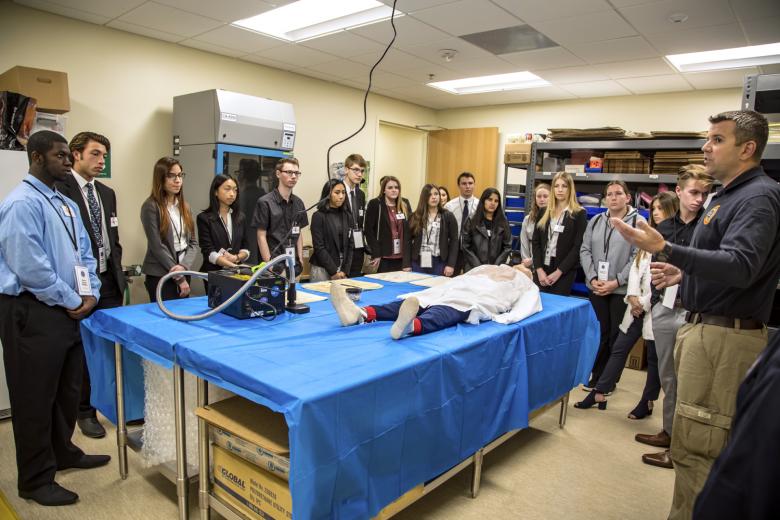When an FBI agent asks a roomful of high school juniors, “How many of you watch FBI shows on TV?” nearly every hand goes up. But at the recent Sacramento FBI Teen Academy, held in March, these 41 students soon learn fact — not fiction — about how the bureau works.
“I have a TV picture in my mind, and I’m interested to see how the real FBI differs,” says Kyle Boal, of Union Mine High School in El Dorado.
“The real FBI probably is not as action-filled as on TV,” adds Sarina Dhillon, of Oakmont High School in Roseville.
The Sacramento Field Office in Roseville began hosting the FBI Teen Academy in 2008 and now holds two classes each academic year, open to high school juniors in a 34-county region. For the spring session, about 100 students applied for 41 available slots.
“By spending a day with us and learning about what we investigate, what is the story behind some of our criminal investigations, what it takes to work for the FBI and who we are, the students return to their communities with solid, real-world information about us and have more than a few tips to share,” says FBI spokeswoman Gina Swankie.
Although Swankie insists that the main goal is not recruiting students for FBI service, many students had career goals in mind.
Boal went into the day “with nothing but pure excitement” to learn more about the FBI in general and possible legal careers in particular. Dhillon signed up for the academy to explore “anything they do with medicine and forensics.” Davon Phillips, of Luther Burbank High School in Sacramento, has wanted to be in law enforcement ever since an FBI agent spoke to his sixth-grade class.
After lunch, their hands-on training begins. The 41 participants are divided into three groups, rotating through training sessions with forensics, firearms training and the bomb squad.
With the FBI Evidence Response Team, students learn about forensic processing of a crime scene. Each student receives a cotton swab and is instructed to swipe potential blood stains on a dummy victim and on carpet samples. They also study the mock scene under a ultraviolet light as their instructor points out that blood stains don’t “glow” as they often do on television.
Next comes a visit to the Firearms Active Training System — a dark room where agents “fire” at a training video playing on a wall. The guns look authentic, but they don’t fire real bullets. The video training sessions offer various scenarios to test agents on their split-second judgment as well as shooting skills.
The final hands-on session takes place in a back parking lot, where the bomb squad mocks up a scene with suspicious packages. Students are taught to approach packages carefully, using technology to help inform decision-making about the type of bomb, its potential impact and the best way to safeguard the area.
Back in the classroom, students hear presentations on internet safety, hate crimes and deadly force. “I liked the presentations and hearing all their stories,” Dhillon says. “The experience in general was very interesting to see all the jobs they do.”
The FBI Teen Academy continues to evolve, based on current events and student feedback. “It’s safe to say that we pay close attention to class comments and have adjusted curricula or other elements accordingly,” Swankie says.
Connecting with students early is important to help them avoid behavioral pitfalls — primarily drug use and felony crime — that might later disqualify them from FBI service. The outreach also helps clear up public misconceptions “that criminal justice and psychology majors are primarily whom we recruit,” Swankie says. “By informing our youth of the diverse backgrounds of our workforce and how important candidates with STEM backgrounds are to us — notably in computer science at the moment — we are able to better prepare another generation of applicants.”
And what about learning about the FBI from TV shows? “The real FBI handles a lot more stuff and it’s a lot harder than TV shows put it,” Phillips says. “It takes more than one hour just to solve my case.”












